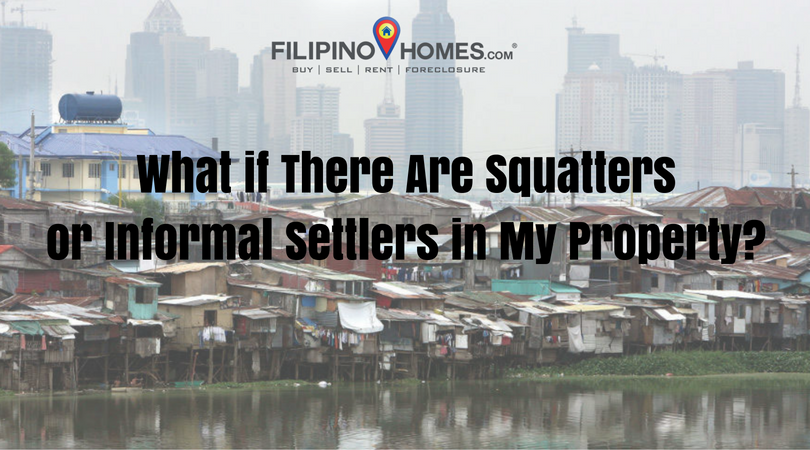
Squatting is a huge social and economic problem in the Philippines. Squatters or informal settlers are also protected by laws that make it difficult to remove them from properties they infest. Squatting is occupying or possessing a real estate property of another persons against his will through any of the following means: force, intimidation, threat, taking advantage of the absence or tolerance of the landowner for residential, commercial or any other purposes. Squatting, in the general sense, was technically considered a criminal offense. Presidential Decree (PD) 772, or the Anti-Squatting Law, effected by former President Ferdinand Marcos in 1975 made prosecuting “squatting and other criminal acts” relatively easy states that:
Any person who, with the use of force, intimidation or threat, or taking advantage of the absence or tolerance of the landowner, succeeds in occupying or possessing the property of the latter against his will for residential commercial or any other purposes, shall be punished by an imprisonment ranging from six months to one year or a fine of not less than one thousand nor more than five thousand pesos at the discretion of the court, with subsidiary imprisonment in case of insolvency.
However, one must also consider that the squatters or informal settlers also have rights, and being aware of the circumstances that led them to break the anti-squatting law will help you to determine the proper course of action.
As per Republic Act No. 8368 or the “Anti-Squatting Law Repeal Act of 1997”, criminalizing squatting has since been repealed. Furthermore, RA 8368 also authorized dismissal of all pending cases that drew upon the provisions of the now repealed PD 772, and directed criminal cases against squatters to defer to the broader “Comprehensive and Continuing Urban Development Program” described by Republic Act 7279.
In the absence of the land owner, there is a tendency for squatters to occupy a property that is seldom visited. There are two types of squatters or informal settlers that will help your case in determining the actions to take.
Professional Squatters
Individuals or groups having sufficient income for legitimate housing who occupy a property without the landowner’s consent are regarded as “professional squatters” according to Republic Act No. 7279, or the Urban Development and Housing Act of 1992.
The same applies to those who have previously been awarded home lots or housing units by the government, and yet have subsequently sold, leased, or transferred the properties awarded to them, and then settled illegally in the same place or in another urban area. When those illegally occupying your property are determine as professional squatters, they can be legally evicted, as stipulated by Section 27 of RA 7279:
Any person or group identified as such shall be summarily evicted and their dwellings or structures demolished, and shall be disqualified to avail of the benefits of the Program. A public official who tolerates or abets the commission of the above mentioned acts shall be dealt with in accordance with existing laws.
The Act also stipulates that professional squatters or members of squatting syndicates shall be imposed the penalty of six (6) years imprisonment of a fine of not less than PhP 60,000.00 but not more than PhP 100,000 or both at the discretion of the court.
Underprivileged and Homeless Citizens
When the property is being occupied by underprivileged and homeless citizens, having them relocated involves a different and lengthier process that involves a court order stipulating eviction and/or demolition.
There are mandatory provisions involved in the execution of eviction or demolition orders involving underprivileged and homeless citizens clearly stated in Section 28 of RA 7279. The key point is that the property owner should provide at least 30 days’ notice prior to the date of eviction or demolition. The corresponding government entities will also provide:
“adequate consultations on the matter of settlement with the duly designated representatives of the families to be resettled and the affected communities in the areas where they are to be relocated.”
This means that adequate relocation, whether temporary or permanent, should be provided in order for the eviction to be carried out by the government. The property owner is not required by law to give compensation to squatters or informal settlers in order to have them leave the property.
Consult a lawyer regarding how to go about evicting squatters or informal settlers on your property. It is never recommended to forcibly remove squatters from your property, as this could have dire ramifications legally, physically, and financially. While informal settlers are to be consulted regarding their relocation, keep in mind that this does not mean that they have to give consent before leaving; they are still required to leave the property that you legally own.




